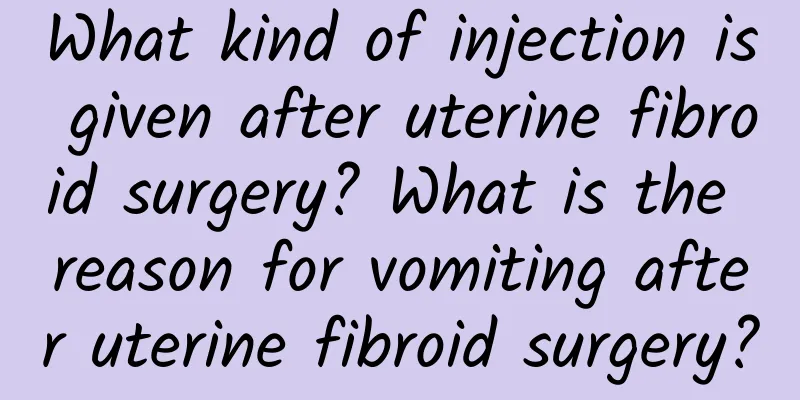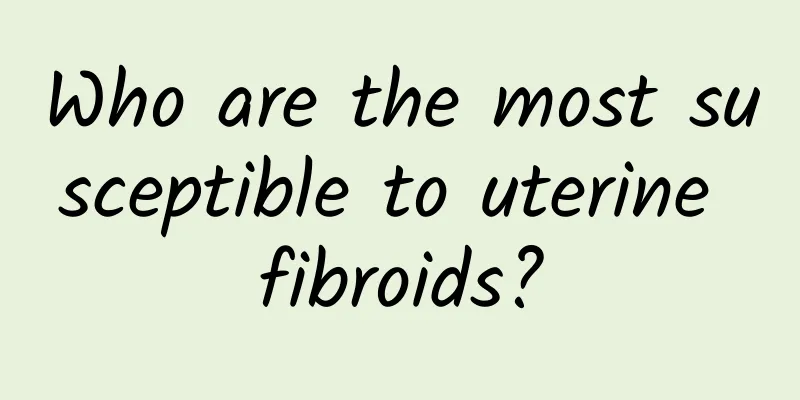What kind of injection is given after uterine fibroid surgery? What is the reason for vomiting after uterine fibroid surgery?

|
What kind of injection is given after uterine fibroid surgery? What is the reason for vomiting after uterine fibroid surgery? Uterine fibroids are a common female reproductive system disease that affects the quality of life of many women. For women with uterine fibroids, surgery is one of the common treatments. The postoperative recovery phase is one of the issues that patients are most concerned about. Many patients and their families will have similar questions: what injections should be given after surgery? What is the cause of vomiting after surgery? 1. What kind of injection is given after the operation? After uterine fibroid surgery, doctors usually prescribe medications to control symptoms and promote recovery. During the recovery period after surgery, doctors may recommend that patients continue to use some drug injections to help patients recover faster. Common injections include antibiotics, painkillers, and drugs that promote wound healing. These drugs can reduce postoperative discomfort, prevent infection, and speed up the wound healing process. 2. What is the cause of postoperative vomiting? Postoperative vomiting is a common side effect that can be caused by a variety of factors. After uterine fibroid surgery, the body undergoes a certain amount of trauma, and you may experience some uncomfortable symptoms during the recovery period, such as nausea and vomiting. Here are some of the possible causes of vomiting: 2.1 Effects of anesthetics During surgery, patients are given anesthesia to ensure safe operation. However, anesthesia may irritate the gastrointestinal tract, causing nausea and vomiting. 2.2 Surgical stimulation Uterine fibroid surgery itself may cause some irritation to the abdominal organs, which can lead to nausea and vomiting. The irritation may come from the manipulation of the abdominal cavity during surgery and from physical activity during recovery. 2.3 Prolonged fasting The procedure requires a period of fasting before surgery, which may cause acid to build up in the stomach, causing nausea and vomiting. 2.4 Medication used after surgery After uterine fibroid surgery, doctors usually prescribe medications to control symptoms and promote recovery. Certain medications may cause gastrointestinal side effects, such as nausea and vomiting. During the postoperative recovery period, patients should try to avoid eating too much greasy food and control the amount and frequency of food intake to reduce the burden on the gastrointestinal tract. At the same time, patients should also use medications correctly according to the doctor's instructions. In summary, the injections given after uterine fibroid surgery may be antibiotics, painkillers, and drugs that promote wound healing. Postoperative vomiting may be caused by the effects of anesthetics, surgical stimulation, long-term fasting, and postoperative drugs. Patients should actively cooperate with the doctor's treatment and guidance, eat a reasonable diet, and exercise appropriately to speed up the recovery process. |
>>: What are the causes of uterine wall fibroids? Symptoms of uterine wall fibroids
Recommend
How to do preventive health care for ectopic pregnancy?
How to do a good job in the prevention and health...
Patients with cervicitis should always pay attention to early symptoms
Nowadays, cervicitis is a common disease among wo...
What causes uterine fibroids?
Uterine fibroids are common benign tumors in wome...
Multiple uterine fibroids often cause a feeling of heaviness in the lower abdomen
Multiple uterine fibroids are common benign tumor...
2 tricks to swing butterfly sleeves, artist baby coach teaches rowing
After bidding farewell to the two-month summer va...
How to diagnose chronic cervicitis in women? Differential diagnosis method of chronic cervicitis in women
Chronic cervicitis is a common gynecological dise...
What to do if the enlarged uterus compresses the bladder due to adenomyosis
When adenomyosis causes the uterus to enlarge and...
Life expectancy of patients with cervical erosion
Regarding the life expectancy of patients with ce...
Women should pay attention to the causes of ovarian cysts
Nowadays, the incidence of ovarian cysts is getti...
What are the common treatments for chronic adnexitis?
Chronic adnexitis is a common disease among women...
How long will acute vaginitis take to heal?
How long will acute vaginitis take to heal? 1. Ac...
How to protect female friends from the harm of ectopic pregnancy?
Ectopic pregnancy is also called ectopic pregnanc...
What can I eat to make my uterine fibroids grow slower? What can I eat to make my uterine fibroids smaller?
Uterine fibroids are a common benign tumor in wom...
Is it difficult for office workers to lose weight? 17 Habits to Help You Lose Weight (Part 1)
Healthy weight loss has always been the hottest t...
The cause of Bartholinitis is complex
The Bartholin's glands are located at the low...









